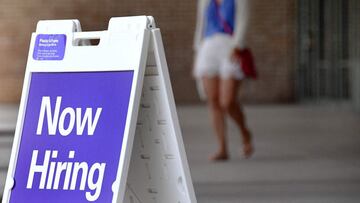How many Americans will lose federal unemployment aid?
With the two main federal pandemic unemployment programs ending on 6 September, more than millions of workers and families find themselves without an income.


A year ago, as the United States was in the throws of confronting the second wave of covid-19 infections, more than 29 million people were claiming unemployment benefits. Last week, the Department of Labor announced that this level had fallen to 12.1 million
Regular continued claims, also referred to as insured unemployment, was 2.6 million the week ending August 21. Adding all Unemployment Insurance programs—including #PUA, #PEUC, and #ExtendedBenefits—a total of 12.2 million workers claimed benefits the week ending August 14. 3/4 pic.twitter.com/oMHIMSB54T
— Equitable Growth (@equitablegrowth) September 2, 2021
When the pandemic took hold in the United States back in March 2020, Congress quickly passed the CARES Act, which made significant changes to unemployment insurance. Through two main programs, the federal government was able to extend the number of weeks those unemployed could claim benefits and increased the value of their benefits.
The tens of millions who lost their jobs benefited from these new programs:
- Pandemic Unemployment Assistance (PUA), which provides unemployment benefits “to individuals who are self-employed, seeking part-time employment, or who otherwise would not qualify for regular unemployment compensation.”
- Pandemic Emergency Unemployment Compensation (PEUC), allowed those eligible to receive unemployment compensation, additional coverage as many states have a cap on the number of weeks claims can be made. This program also provides a $300 topper sent by the federal government in addition to state benefits.
How many people claim benefits under these programs?
The Delta variant contributed to a "lackluster" August jobs report where only 235,000 jobs were added. Many experts were surprised as the figure represented around a third of what was forecasted and is only a fraction of the 900,000 jobs added in June and July.
This report comes as the PUA and PEUC programs end on 6 September, Labor Day. On a day intended to celebrate and honor workers, their government has left millions without an income.
Payroll employment rises by 235,000 in August; unemployment rate declines to 5.2% https://t.co/1Y9cSWJUIB #JobsReport #BLSdata
— BLS-Labor Statistics (@BLS_gov) September 3, 2021
In mid-August, just two short weeks ago, 5.4 million people had claimed PUA benefits. This up around 200,000 claims from mid-July when the figure stood at 5.2 million. However, while still higher than July, the figure is down significantly from the 14.95 million people participating in the program a year ago.
As for PEUC, 3.8 million people claimed benefits for the week ending on 14 August. The number of people claiming PEUC benefits has decreased since mid-July when the number was recorded at 4.2 million. The number of beneficiaries of this program has increased because a year ago many were still eligible for benefits from their state governments and were not dependent on federal assistance.
All in all-around 9.2 million people have lost their benefits based on data from mid-August. This could have serious consequences on the economic recovery as household incomes plummet.
In early August, Eliza Forsythe, an assistant professor and economist at the University of Illinois told CNBC that Congress should consider extending the benefits because “It’s certainly possible we could have another round of economic contraction in certain areas if there’s an outbreak.” She then said that without the PEUC and PUA program, “the unemployment system won’t be there for people the way it’s been over the past year.”
Will the programs be extended?
Related stories
The US Congress has allowed these benefits to expire and very few leaders on Capitol Hill seem interested in extending the programs any further.
The Biden administration has stated that rather than a national extension, they encourage state leaders to use funds from the American Rescue Plan to extend benefits should they deem it necessary.
- Unemployed
- Covid-19 economic crisis
- Working population
- Unemployment compensation
- Unemployment rate
- Science
- Unemployment
- Coronavirus Covid-19
- Economic crisis
- Pandemic
- Coronavirus
- Recession
- Economic climate
- Virology
- Outbreak
- Infectious diseases
- Employment
- Diseases
- Microbiology
- Medicine
- Economy
- Work
- Biology
- Health
- Life sciences

